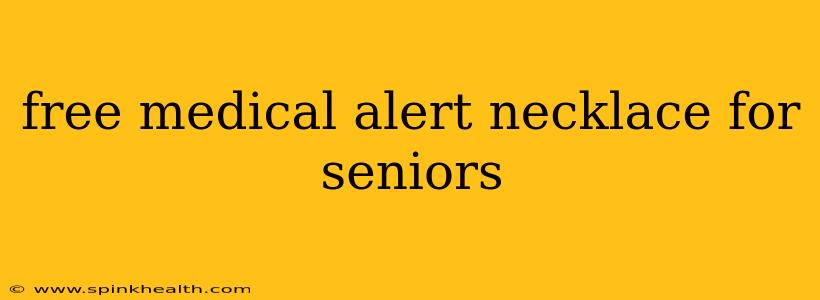The peace of mind that comes with knowing help is just a button press away is invaluable, especially for our senior loved ones. A medical alert system, often delivered via a necklace or pendant, can be a lifeline in emergencies. But the cost can be a barrier for some. So, the question many ask is: Are there free medical alert necklaces for seniors? The short answer is: not exactly free, but there are options that significantly reduce or eliminate the cost. Let's delve into the details.
How Can Seniors Get a Discounted or Subsidized Medical Alert System?
The truth is, most medical alert companies operate on a subscription model. They provide the device (necklace, wristband, or pendant) and the monitoring service, which is the crucial part that connects you to emergency responders. While the initial device might be offered at a low cost or even “free,” the monthly monitoring fee is the ongoing expense. However, several avenues can help seniors access these systems at reduced cost or even completely covered:
Are there any government programs that provide free medical alert systems?
Unfortunately, there isn't a federal program that directly provides free medical alert necklaces. Medicare and Medicaid do not typically cover these devices. However, some states or local governments might have programs assisting seniors with assistive technology, including medical alert systems. It's worthwhile to contact your local Area Agency on Aging or your state's department of aging to explore potential programs. They might have partnerships with medical alert companies to offer discounts or subsidized services.
Can charities or non-profit organizations help cover the cost?
Many charitable organizations focus on assisting seniors with healthcare needs. Some might offer financial assistance or grants to cover the cost of medical alert systems. Researching local charities and non-profits in your area is essential. Some national organizations also offer aid programs. Be sure to check their eligibility criteria as they often have specific requirements.
Do some medical alert companies offer free trials or heavily discounted options?
Yes, some companies offer promotional periods with reduced or waived fees for a limited time. Others may have special offers for specific groups, such as veterans or those with low incomes. Carefully compare the offers from different companies; the "free" device often comes with a longer-term contract and a higher monthly fee. Read the fine print to avoid unexpected costs. Look for transparent pricing and contract terms.
What factors influence the cost of a medical alert system?
Several factors influence the pricing, including:
- Type of device: A basic necklace might be less expensive than a system with fall detection or GPS tracking.
- Monitoring service: The level of monitoring (24/7 vs. limited hours) will affect the monthly fee.
- Contract length: Longer-term contracts often have lower monthly costs.
- Additional features: Features like fall detection, GPS location tracking, and two-way communication significantly impact the cost.
Finding Affordable Medical Alert Systems: A Step-by-Step Guide
- Contact your local Area Agency on Aging: They are a fantastic resource for finding local assistance programs.
- Research local charities and non-profits: Explore organizations that support seniors in your community.
- Compare medical alert companies: Check for promotional offers, discounts, and transparent pricing.
- Consider your specific needs: Determine the essential features you need in a medical alert system.
- Read reviews: Check online reviews from other users to gauge the reliability and customer service of different companies.
Obtaining a medical alert system doesn't have to break the bank. By exploring various options and doing your research, you can find an affordable solution that provides peace of mind for your senior loved ones. Remember, the investment in safety and security is invaluable.

